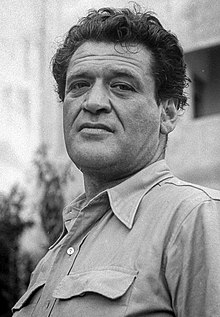Joseph Kessel

Joseph Kessel (10 February 1898 – 23 July 1979) was a French journalist and novelist.
Kessel was born in Villa Clara, Entre Ríos, Argentina, because of the constant journeys of his father, a Litvak doctor. Joseph Kessel lived the first years of his childhood in Orenburg, Russia, before the family moved to France in 1908. He studied in Nice and Paris, and took part in the First World War as an aviator. He was also an aviator during the Second World War, assigned to the Free French 342 "Lorraine" bomber Squadron of the Royal Air Force, with Romain Gary, who was also a talented French novelist.
Kessel wrote several novels and books that were later represented in the cinema, notably Belle de Jour (by Luis Buñuel in 1967). He was also a member of the Académie française from 1962 to 1979. In 1943 he and his nephew Maurice Druon translated Anna Marly's song Chant des Partisans into French from its original Russian. The song became one of the anthems of the Free French Forces during the Second World War.
Joseph Kessel died in Avernes, Val-d'Oise. He is buried in the Cimetière du Montparnasse in Paris.
The Joseph-Kessel Prize (Prix Joseph Kessel) is a prestigious prize in French language literature, given to "a book of a high literary value written in french". The jury counts or has counted among its members Tahar Ben Jelloun, Jean-Marie Drot, Michèle Kahn, Pierre Haski, Gilles Lapouge, Michel Le Bris, Érik Orsenna, Patrick Rambaud, Jean-Christophe Rufin, André Velter and Olivier Weber.
Bibliography
- La steppe rouge (1922)
- L'équipage (1923)
- Mary de Cork (1925)
- Les captifs (1926; Grand Prix du roman de l'Académie française)
- Nuits de princes (1927)
- Belle de Jour (1928; it inspired Luis Buñuel's 1967 movie of the same name)
- Vent de sable (1929)
- Fortune carrée (1932)
- Coup de Grâce (1936; made into the movie Sirocco in 1951 with Humphrey Bogart)
- La Passante du Sans-Souci (1936; turned into a movie by Jacques Rouffio in 1982)
- Hollywood, Ville mirage (Gallimard, NRF, 1936)
- L'Armée des ombres (1943; turned into a movie by Jean-Pierre Melville in 1969)
- Bataillon du ciel (Sky Battalion), (1946; turned into a movie by Alexandre Esway in 1947): Free French SAS paratroopers in Brittany in Summer 1944
- Le tour du malheur (1950)
- La Vallée des Rubis (1955)
- Le lion (English translation: The Lion; 1958)
- The Magic Touch (novel), also published in USA as The Man with the Miraculous Hands (1962)
- Les cavaliers (1967) (filmed as The Horsemen in 1971.
- Partout un ami (1972)
- Des hommes (1972)
- Les temps sauvages (1975)
- The escape
External links
- Joseph Kessel at IMDb
- Biography at the Académie française Template:Fr icon
- Plaisir Litteraire: [1] an interesting contribution about the youth of Joseph Kessel's father Template:Fr icon
- 1898 births
- 1979 deaths
- People from Entre Ríos Province
- Argentine Jews
- Argentine people of Lithuanian-Jewish descent
- French journalists
- Reporters and correspondents
- 20th-century French novelists
- French travel writers
- French war correspondents
- French Jews
- Jewish novelists
- People from Nice
- Members of the Académie française
- Lycée Louis-le-Grand alumni
- French people of Lithuanian-Jewish descent
- Grand Officiers of the Légion d'honneur
- Burials at Montparnasse Cemetery
- Grand Prix du Roman winners
- French military personnel of World War I
- French male novelists
